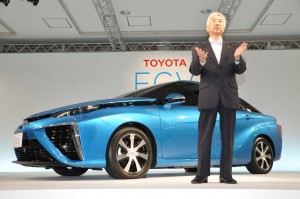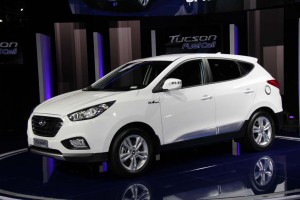
Toyota Executive Vice President Mitsuhisa Kato reveals the company's new FCV fuel cell vehicle in Japan.
Hyundai’s first fuel-cell vehicle, a zero-emissions version of its Tucson sport-ute, has just gone on sale in Southern California, and hydrogen-powered Honda and Toyota models will follow in the months ahead. Mercedes-Benz is fleet testing its own F-Cell model, and other makers, such as General Motors, may soon enter the fuel-cell market, as well.
To proponents, hydrogen is the ultimate form of clean energy, and one that overcomes many of the drawbacks of battery power such as limited range and long charging cycles. Yet reaction to the technology remains sharply divided.
Elon Musk, founder and CEO of TeslaMotors, the California-based battery-carmaker, has repeatedly asserted that hydrogen vehicles will never pay off commercially, deriding them as “fool cells.”
But after years on the back burner as money and resources were shifted to battery technology, hydrogen has been regaining momentum in the U.S. and abroad.
The Japanese government has announced it is raising its investment in fuel-cell search and will expand the availability of hydrogen in the country. Japanese Prime Minister Shinzo Abe said recently his administration would begin providing additional support to the country’s fuel-cell vehicle industry, as part of his overall growth plan.

Hyundai is just bringing its Tucson-based hydrogen fuel-cell vehicle to market in Southern California.
To proponents, fuel-cell vehicles are seen as something of a Holy Grail because they produce nothing more harmful than water vapor in their exhaust, eliminating the CO2 that is thought to contribute to climate change.
Toyota says its fuel-cell-powered sedan – which will cost around $69,000 when it debuts in Japan — can travel over 400 miles without refueling, about 50% more than the most expensive version of the Tesla Model S and as much as five times as far as some of the other battery-electric vehicles now on the market. Meanwhile, it will only take three minutes to refuel, similar to a gasoline engine car, according to Toyota.
(Click Here for more on the new Toyota fuel-cell vehicle.)
Hyundai became the first manufacturer to begin leasing fuel cells to customers in Southern California this summer through three southern California dealers: Win Hyundai in Carson, Tustin Hyundai, and Hardin Hyundai in Anaheim.
Michael O’Brien, Hyundai Motor America vice president of corporate and product development, said Hyundai is leasing vehicles to customers who have an opportunity to refuel on a regular basis. “We’re asking anyone who wants to lease a vehicle to fill out a questionnaire,” O’Brien explained, noting the objective is to make sure a fuel-cell version of the Tucson will fit their driving habits. With only a handful of refueling locations yet open, it is critical customers are close enough to a hydrogen station not to get stranded.
Hyundai plans to lease more of the fuel-cell vehicles as more hydrogen stations are added around Los Angeles and in other parts of California, O’Brien said during a visit to Hyundai-Kia Technical Center near Ann Arbor, Michigan.
(Hyundai-Kia named “greenest” automaker, toppling long-time enviro leader Honda. Click Here for more.)
California lawmakers recently approved funds that would set up a network of at least 100 hydrogen stations by decade’s end, though advocates hope the energy industry will boost that number if demand for the vehicles grows.
New York is among other states considering similar measures. Meanwhile, Germany has also approved funding for a network of hydrogen stations that would cover the entire country in the coming years.
(California dropping nearly $50 million on new hydrogen fueling network. Click Hereto learn more.)
Nearly a half-century after fuel-cell technology provided the electric power for the Apollo moon mission, hydrogen technology has made significant strides. Today’s technology is significantly smaller, lighter, more powerful and more efficient than the fuel-cell systems in use barely a decade ago. Critically, current fuel-cell “stacks,” the hydrogen equivalent of an engine, can operate in sub-freezing temperatures.
Still, there are plenty of challenges, cost chief among them. And there, the key is reducing the amount of platinum and other rare metals required to make a fuel-cell stack work. New production techniques that reduce the use of rare metals to the thickness of a micron will certainly help bring down prices, Hyundai’s O’Brien said.
Hyundai has tried to minimize the cost penalty. The Tucson Fuel-Cell Vehicle is being leased at a price of just $499 per month – and that includes unlimited free hydrogen refueling and At Your Service Valet Maintenance at no extra cost.
Dave Zuchowski, president and chief executive officer, Hyundai Motor America, said the range and refueling speed of our new Tucson Fuel Cell compares favorably with gasoline vehicles, making them a seamless transition for customers from traditional gasoline vehicles.
Not everyone is convinced. “Fuel cells have always been 10 years in the future for as long as I can remember,” says Joseph Phillippi, senior analyst with New Jersey-based AutoTrends Consulting.
Honda took things perhaps further than any of its competitors when, in 2005, it began a limited lease program with the FCX Clarity hydrogen car. But the project was sidetracked by infrastructure issues and the emergence of battery-electric vehicles that suddenly sucked up research dollars — and stole the media spotlight. Honda — along with Hyundai and Toyota — is now back touting its fuel-cell vehicles once again, and proponents think, this time, the technology might work.
“Fuel-cell cars are not vehicles of the future – they’re here now, and we applaud Hyundai for bringing them first to market in California where they are most needed,” said California Air Resources Board Chairman Mary Nichols. “These ultra-clean vehicles play a critical role in our efforts to clean the air and meet our climate goals.”
(Paul A. Eisenstein contributed to this report.)

Why on earth a vehicle needs to have FUGLY styling to be a reduced emissions vehicle is beyond me…